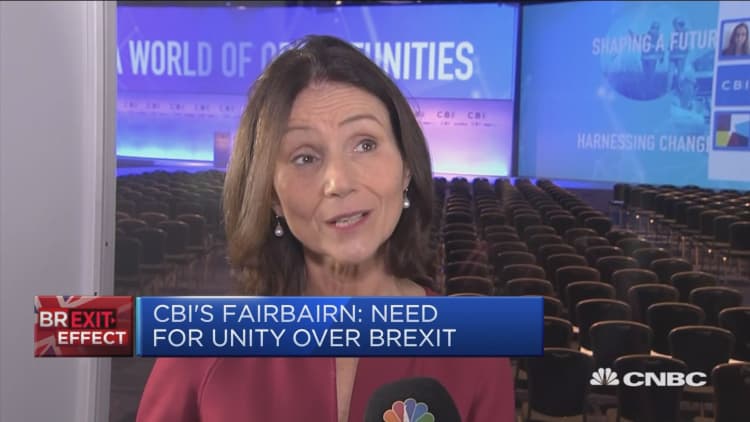
U.K. Prime Minister Theresa May outlined her vision for Britain's industrial future Monday, while the leader of the U.K.'s opposition Labour party also set out his proposals for "big changes" to the country's economy.
Both the prime minister and Labour leader Jeremy Corybn gave speeches at a Confederation of British Industry (CBI) conference in London. Conservative leader May defended the free market economy and said there are "huge opportunities" in Britain over the next decade.
"We cannot — and will not try — to make a plan for every corner of our economy. We believe in the free market and won't attempt to shield the economy from market forces. So we will have to make strategic decisions about where the government can — and where it cannot — best support key sectors of our economy," she said.
"As we look ahead to the next 10 years for Britain's economy, we should do so as rational optimists." She gave more details on her government's "industrial strategy," which includes plans to boost investment in skills and infrastructure.
The speech to the CBI conference was closely watched by business leaders who want to know how the government will manage Britain's economic transition out of the European Union.
In her speech Monday, May played down the slow progress in Brexit negotiations, however, and addressed concerns among British businesses that they could face a "cliff-edge" scenario if Britain leaves the EU in March 2019 without a deal.
"I have made clear that a strictly time-limited implementation period will be crucial to our future success," she said, adding that "during this period access to one another's markets should continue on current terms, and I want us to agree the detailed arrangements for this period as early as possible."
Corbyn's vision
While Brexit is at the forefront of the Conservative government's agenda currently, the increasing popularity of Labour leader Jeremy Corbyn is going unnoticed by the government.
The staunch Socialist is popular among younger voters and the party made strong progress in a general election in June, gaining 32 seats in parliament. The left-wing Corbyn has a way to go to convince many British voters and businesses that the country and its economy would be safe in his hands, however.
Corbyn tried to assuage concerns of businesses when speaking at the CBI conference on Monday, telling the audience that there is "common ground" between business and Labour to deliver "big changes" to the British economy.
"Common ground on Brexit, common ground on investment, training and industrial strategy, and a government that embraces its responsibilities and carries them out for the common good. That's what Labour offers you," he said.
He added that Britain's economic model needs to change, advocating "an economy for the many."
"We all know an economic model that allows a few to grow very rich while the majority face falling incomes and rising indebtedness, that leaves too many people in unfulfilling and insecure work, that is overly reliant on one sector in one region of our country, is neither stable nor sustainable," he told the conference.
This will mean making some "big changes," he said, to tackle Britain's problems of "low investment, low productivity and low pay."
Like the Conservatives, Labour advocate an infrastructure investment program using what they call a "National Transformation Fund" that Corbyn said would "reverse years of under-investment in the regions, investing in transport, energy and digital infrastructure right across the country."
Common ground
While the economic models advocated by the Conservatives and Labour differ, there is common ground between the two parties in terms of both promoting investment in infrastructure and skills, and the need for a transitional deal following the Brexit deadline.
Director-General of the CBI, Carolyn Fairbairn, told CNBC Monday there was a need for a consensus.
"Today (Monday) we have the prime minister and the leader of the opposition here … And that does say something important about the need for unity," she said.
"We are facing two enormous changes in our country. One is around Brexit and the other is around the fourth revolution — the technology transformations — and we need a single, clear vision and strategy on both so we very much welcome the fact we have a significant meeting of minds with the leader of the opposition."


